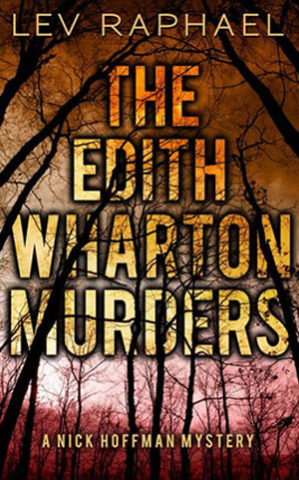 The Edith Wharton Murders
The Edith Wharton Murders
by Lev Raphael
Published by St. Martin’s Press
Published September 1997
Fiction (mystery)
227 pgs. • Find on Amazon.com
Reviewed by Stephen O. Murray
May 24, 2002.
The Ethan Wharton Murders (1997) is the third of (so-far) five mystery novels in which murders occur around Nick Hoffman, a gay Edith Wharton scholar soon to come up for tenure in a rancorous department at the State University of Michigan that is the unhappy fusion of earlier departments of Rhetoric, English, and American Studies.
Lev Raphael’s author blurb says that he “successfully escaped academia”—specifically the large state university in the middle of Michigan. He has changed the word order so that the acronym can become State University of Murder, as Nick is shocked that having never had any proximity to murder growing up in New York City, murders keep happening very close to him in what he’d expected to be the peaceful Midwest. Raphael is also the author of an out-of-print 1991 book Edith Wharton’s Prisoners of Shame: A New Perspective on Her Neglected Fiction, so he has given Nick his own research specialty.
Nick likes to teach, which makes him a freak in a large university with research pretensions. His tenured colleagues mostly abhor students, whether or not they are having sexual relations with them. And the distaste runs in both directions.
Nick has a male lover, Stefan, a tenured (?) writer-in-residence in the same department. They seem to be the only monogamous couple around, though they do not fail to notice the studly protégé of the department’s affirmative-action hire, their neighbor and friend Lucille Mochtar.

Nick is uneasy with the apparent intimacy between Lucille and the seductive student, Delaney Kildare, who wants to be Nick’s teaching assistant for a course on the mystery novel that Nick has proposed. Delaney has a mysterious in with the Jabba-the-Hut dean and has approval to fund the position even before the department has approved the course. Delaney also provides Nick suspicious sympathy about being overshadowed by Stefan, the author of five literary novels (to Nick’s one Wharton bibliography).
As the author of seven books in addition to the five Nick Hoffman mysteries (three coauthored with his lover [26 as of late-2016]), Raphael is familiar with the world of publishing as well as that of academia (both vipers’ nests). Lucille is a former New York publishing house editor and her husband, Didier, has a half-million dollar advance to expand a New Yorker piece he wrote about their experiences with fertility clinics into a book. So there is a lot about the relationships of writers and publishers as well as relationships among academics and would-be academics (graduate students: undergraduates are invisible) in addition to the corpses that seem to seek Nick out.
There were some at a previous Wharton conference he organized, and now there is the corpse of Jesse Benevento, the Christian fanatic student who is the son of the chairman of the history department (which is housed in the same ancient campus building as the English (etc.) department) and had complained about some comment about sex that Nick made in a course the boy took the year before. He is knifed during a melee around someone handing out Bibles on the main campus bridge (under which another corpse had been found in the first Nick Hoffman mystery, Let’s Get Criminal). And why was Jesse carrying a Penguin paperback of Adolphe (one of Wharton’s favorite books, along with Flaubert’s, Stendahl’s, and Middlemarch), since he was enrolled in no French or comparative literature courses and his choice in unassigned reading seemed to be confined to the Bible?
Whether there is a connection to the escalating hate messages directed at Lucille is not clear, but there is plenty of intrigue in the tiny principality of the English-American Studies-Rhetoric Department, along with Stefan’s declining sales and Wharton projects coming Stefan’s way. Raphael keeps the tales of careers, rancors, and murders moving with a range of characters who are more than convenient types. I could have done with less detail about what Nick puts in his mouth (there are no explicit sex scenes: I mean disgusting things like vanilla hazelnut coffee and Pepperidge Farm Bordeaux cookies—do transplanted gay Jewish New Yorkers not only consume but notice such things?)

Creative Commons photo by Jeff Ness
As an alumnus of the model for the State University of Michigan (though long ago, and without having taken any courses in English, and tested out of the required three courses in American Thought and Literature) with more than passing continued ties to academia, it seems to me that the English department (let alone one that has swallowed two others) at a university with 50,000+ students would be bigger. It also seems to me an undue strain on credulity that the History department could be crammed into the same small, old building. These are minor cavils, more than offset by the impetus to reread Adolphe and Wharton’s Summer, for which Nick has been recruited to prepare a critical edition.
In addition to a skillfully plotted mystery, Raphael delivers entertaining insights into the making, canonizing, selling, and teaching of literature and micro- and macropolitics in and around a multiversity.
This summation seems fairly accurate:
Hardly any academics are happy where they are, no matter how apt the students, how generous the salary or perks, how beautiful the setting, how light the teaching load, how lavish the research budget. I don’t know if it’s academia itself that attracts misfits and malcontents, or if the overwhelming hypocrisy of that world would have turned even the Van Trapp family sullen. (180)
The author’s website is here.
published on epinions, 24 May 2002
©2002, 2016, by Stephen O. Murray

